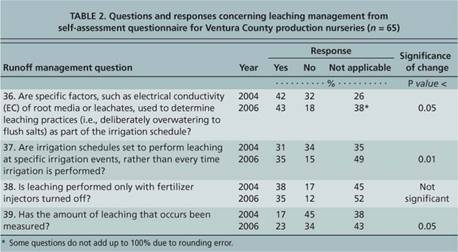We’d like to challenge you to take the following quiz. Take a minute to place a check mark next to all the practices you regularly employ in your operation. Go ahead – we won’t be collecting them!
Part 1
Yes/ No I know what the nitrogen requirements (lbs actual N/acre/year or /tree/year) are for my crops
Yes/ No I know what the nitrogen levels are in soil amendments I use in my operation (compost, manure, crop residues, etc.)
Yes/ No I have lab analysis of my well/irrigation water.
Yes/ No I monitor tissue levels of nitrogen in my crops to help with fertilizer decisions.
Yes/ No I have put together a nutrient budget that considers all sources of nitrogen for the crops I produce.
Part 2
Yes/ No When I do apply nitrogen, applications are timed according to crop requirements.
Yes/ No I use fertigation to apply nitrogen.
Yes/ No Applications of nitrogen are split into smaller doses to improve efficiency of uptake.
Yes/ No I use cover crops that help manage nitrogen availability.
Yes/ No I manage irrigations to avoid nutrient loss below the rootzone of the crop.
If you marked yes to these as regular activities, you’ve just taken steps in showing how your production decisions can protect water quality. The combined activities noted in Part 1 constitute a Management Practice that protects water quality by developing a nutrient budget to help apply only the appropriate amounts of fertilizer. Activities in Part 2 may alone or in combination constitute Management Practices that help ensure fertilizers are applied efficiently.
Every grower uses ‘management practices’, many of which are meant to generate the best possible product for market. Depending on who you’re talking with, the term ‘management practice’ can be something your Farm Advisor recommends (i.e., pruning to control tree height), your produce buyer suggests (protect avocados in bins from sun scald), or the term can have regulatory connotations.
You’ve all probably heard the term Best Management Practices. Best Management Practice (BMP) is defined in the Federal Clean Water Act of 1987, as “a practice or combination of practices that is determined by a state to be the most effective means of preventing or reducing the amount of pollution generated by nonpoint sources to a level compatible with water quality goals.” The term “best” is subject to interpretation and point of view. In recognition of this, the Coastal Zone Reauthorization Amendment (2000) substituted the terms Management Measures and Management Practices.
How can you tell if any individual activity constitutes a Management Practice that meets the needs of a regulatory program to protect water quality? Ask yourself this question: Can the activity stand alone and result in water quality benefits? Just knowing the nitrogen requirements of your crop doesn’t result in any water quality benefits – developing and using a nitrogen budget for your crop can. A nitrogen budget that takes into account the nutrients applied in amendments, irrigation water, and fertilizers in meeting the requirements of your crop does have the potential to protect water quality from nitrogen pollution from your operation.
Some Management Practices can have water quality benefits as a stand alone activity. Cover crops are recognized as a Management Practice that can help manage both sediment and nutrients to reduce the potential of pollution when used appropriately.
Water quality protection is being asked of all industries in California. You have the opportunity to take credit for all of the activities you already do, like the ones listed above, that protect your local water bodies and/or groundwater from nonpoint source pollution from your operation. Look for additional articles in the coming issues to help you in this effort.
For additional background information on water quality legislation, and nonpoint source pollution from agriculture you can download the following free publications from the University of California’s Farm Water Quality Program:
Water Pollution Control Legislation
Nonpoint Sources of Pollution from Irrigated Agriculture
